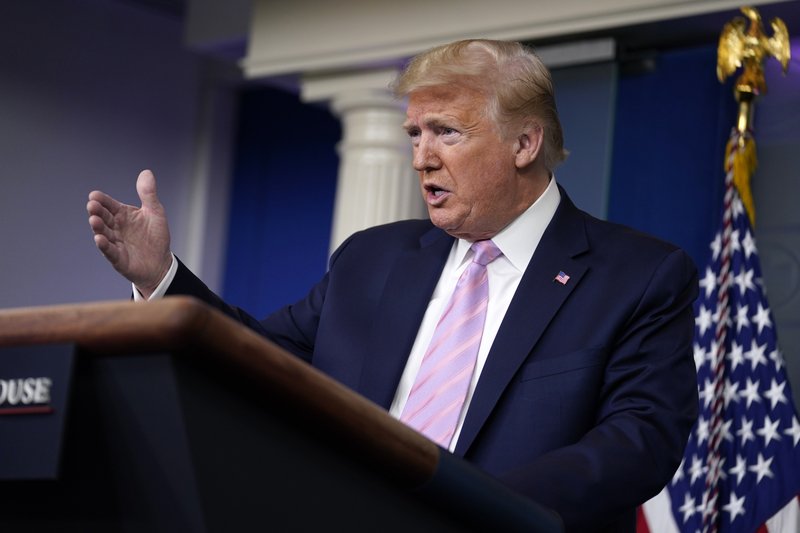At the end of a week officials had warned would be this generation’s Pearl Harbor, White House officials pointed to hopeful signs that the spread of the coronavirus could be slowing, even as President Donald Trump insisted he would not move to reopen the country until it is safe.
At the same time, Trump said he would be announcing the launch of what he dubbed the “Opening our Country” task force, next Tuesday to work toward that goal.
“I want to get it open as soon as possible,” he said at a Good Friday briefing, while adding: “The facts are going to determine what I do.”
With the economy reeling and job losses soaring, Trump has been itching to reopen the country, drawing alarm from health experts who warn that doing so too quickly could spark a deadly resurgence that could undermine current distancing efforts.
But Trump, who had once set Easter Sunday as the date he hoped people in certain parts of the country might begin to return to work and pack church pews, said he would continue to listen to health experts like Drs. Anthony Fauci and Deborah Birx as he considers what he described as the “biggest decision I’ve ever had to make.”
While “there are both sides to every argument,” he said, “we’re not doing anything until we know that this country is going be healthy. We don’t want to go back and start doing it over again.”
Trump’s comments came at the end of a week officials had warned would be a devastating one for the country. Hours earlier, Johns Hopkins University announced that the worldwide death toll from the coronavirus had hit a bleak milestone: 100,000 people. That includes about 18,000 in the U.S., where about half-million people have been confirmed infected.
More than 40% of the deaths in the U.S so far have happened in New York state, which reported 777 new deaths on Friday. But there were also signs of hope. State officials reported that the number of people in intensive care dropped for the first time there since mid-March. Hospitalizations are also slowing, with 290 new patients admitted in a single day versus daily increases of more than 1,000 last week.
While bemoaning the death numbers as “so horrible,” Trump said “tremendous progress” is being made.”
“In the midst of grief and pain, we’re seeing clear signs that our aggressive strategy is saving countless lives,” he said, pointing to models that are now forecasting far fewer U.S. deaths than had originally been predicted.
Health experts have warned, however, that if the country rolls back restrictions too quickly, case levels could once again begin to soar, especially without widespread testing to determine who might be a carrier of the virus. While the new coronavirus causes mild or moderate symptoms for most people, for some, especially older adults and people with existing health problems, it can cause more severe illness or death. And research has shown that people can be highly infectious even if they are not displaying symptoms.
Fauci, the nation’s top infectious-diseases expert, told CNN that the timeline for reopening the country would be informed by a team that has been reviewing data day-by-day and presenting that information to the president.
“The virus kind of decides whether or not it’s appropriate to open it,” he said. “The one thing you don’t want to do is you don’t want to get out there prematurely and then wind up backtracking.”
Still, he cautioned that there will most certainly be cases when that day comes.
“When we decide, at a proper time, when we’re going to be relaxing some of the restrictions, there’s no doubt you’re going to see cases,” he said. “The question is how you respond to them.”
As a clearer picture of the virus begins to emerge, data has begun to show that it is having a particularly devastating impact on an already vulnerable population — black Americans.
There were 13,000 deaths across the nation as of Thursday. Officials had publicly shared demographic data about nearly 3,300 of those victims, and about 42% of that group were black, according to an Associated Press analysis. African Americans account for roughly 21% of the total population in those places. Black adults suffer from higher rates of underlying health conditions like obesity, diabetes and asthma, which put them at higher risk for severe complications.
To that end, U.S. Surgeon General Jerome Adams on Friday made a plea to minority communities to follow social distancing guidelines — if not for themselves, then for their family members.
“Do it for your abuela. Do it for your granddaddy. Do it for your Big Mama. Do it for your Pop Pop,” he said, adding that they should also avoid alcohol, tobacco and drugs.
“We need you to understand, especially in communities of color, we need you to step up and help stop the spread so that we can protect those who are most vulnerable,” he said.
Asked whether his comments could be deemed offensive for viewers, Adams, who is black, said that was not his intention.
“That’s the language that we use and that I use,” he said.
(AP)











